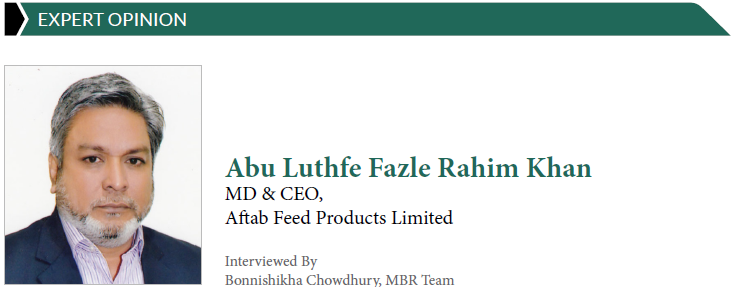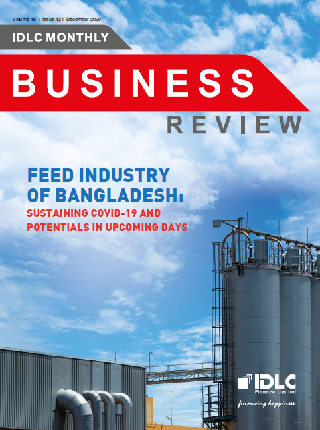
Abu Luthfe Fazle Rahim Khan MD & CEO, Aftab Feed Products Limited
Bonnishikha Chowdhury, MBR Team
MBR: How the COVID-19 pandemic affected this sector? What is your view regarding the impact of the pandemic on this sector? Being a market leader, how did you manage and organize your company activities during this COVID 19 pandemic situation?
Abu Luthfe Fazle Rahim Khan: The feed industry is a key to the backward linkage of the animal-based food system. Safeguarding animal feed is a significant step in ensuring safe food for human consumption. The increasing awareness about livestock nutrition, the progression of the livestock sector, and the rise in the consumption of poultry meat, fish, egg, and milk has led to an increase in the market size of the feed industry in Bangladesh. Preliminary research findings show that by the end of April approximately 70% of small to medium-sized broiler farms had temporarily stopped farming and trading. Although by June, half of these farms had restocked with day-old chicks, albeit on a smaller scale due to the uncertainty surrounding the likelihood of further losses. The dilemma of farmers in turn significantly affected the business of poultry & feed sectors. A follow-up study in June showed there had been a 30-45% reduction both in day-old chick & feed production. In April, the market price of day-old chicks has dropped below the production cost. It also seen severe disruptions in the supply chain due to bottlenecks in transportation, trade, and labor. Rumors, particularly on social media, that coronavirus could be transmitted to people through livestock and livestock products, combined with the new lockdown measures, caused serious damage in production, supply chain, and distribution networks. Consequently, many people employed in these supply chains, such as fish vendors, processors, suppliers, or transport workers are at risk of losing their jobs and livelihoods. We assume that the supply-demand mismatch for poultry would continue due to the COVID-19 situation. The prices of eggs, broiler chickens, and fish will take time to shape into a stable position due to imported DOC cost, difficulties, and fluctuation of feed’s raw material cost in local & international market.
To address the COVID-19 situation we have multiple measures to run our business operations:
Combined efforts from government and private sectors to stop the misconception & rumors about chicken and eggs by creating awareness to general people through social & digital media. Rather we established that chicken & eggs have played a significant role in the development of immunity and antibodies amid the Covid-19 pandemic. As a measure to ensure an undisrupted supply chain during the lockdown crisis, we launched and used alternative channels like e-commerce, digital, and SMS communication to reach our channel partners as well as farmers to respond to their needs. Despite the government lockdown, we continued our operation from home using digital platforms.
MBR: What are the challenges feed industry will face after the pandemic? What will be possible solutions to overcome the hurdles?
Abu Luthfe Fazle Rahim Khan: Demand of Broiler chicken and cost of raw materials are the major challenges for our industry. Major raw materials of animal feed are soybean and maize, significant portion of which is sourced internationally. If the import scenario remain stagnant, that will cause a nationwide crisis of raw materials for animal feed. In order to control the suppliers, it is imperative for the government to take price stabilization measures. Cash subsidy to the farmers will help to reduce the production cost of maize, soybean as well as other commodities. Government should intervene more
against the misconception regarding broiler chicken. To increase demand, Government should purchase more broiler chicken for their institutions.
MBR: How did you manage the cash flow during the pandemic? Is existing financial system sufficient to support the industry demand? What kind of support do you expect from financial institutions in future?
Abu Luthfe Fazle Rahim Khan: Covid-19 put us in a challenging position to carry on our fund management tasks. We are proud being a good borrower and
maintained good relationship with our banks and financial institutions. Since the pandemic we are focusing on cash sales. In contrary, we procured raw materials with extended credit terms. In addition, we eliminated a good portion of non-value added expenses to be more efficient in operation.We must acknowledge the contribution by the farmers in our industry. Interest rate and availability of fund to the feed manufacturer and farmer is equally very important. One more thing needs to be noted that the market is very competitive and price fixed by the market. Present interest rate is too high for this industry and absence of livestock insurance make us more vulnerable. Agricultural & Rural Credit Policy and Program of Bangladesh bank is there but they are still not sufficient for our marginal farmers. We expect financial support with easy and flexible terms for the farmers and agro industries. Interest rate should not be more than 4% for our marginal farmers to lower their operating cost. Insurance on Live stock could be a game changer of our industry, this will offset the systematic risk occurred due to disease and natural disaster.
MBR: Share your experience regarding applying new technology or innovation in feed sector for ensuring effectiveness and efficiency?
Abu Luthfe Fazle Rahim Khan: Aftab is one of the leading producer of animal feed and having consistency in quality through world class Machineries as well as Technology. To achieve consistency in quality, a Feed Miller has to establish Animal Nutrition Lab. Aftab is one step ahead to establish world class sophisticated Nutrition Lab where tests are performed in HPLC and NIR machine. Aftab is pioneer in feed business in Bangladesh and pioneer in using world class new Technology as well. Our Breeder Feed Plant is one of the state of the arts Feed Mill in Bangladesh equipped with world leading Van Aarsen Technology. This plant is having accurate Dosing System and most effective Conditioning System to kill 100% microbial using Long Term Vessel (LTV). A very efficient Remote Monitoring System is being used to operate the plant where all the trouble shooting is being supervised from the Netherlands. Energy efficiency is one of the prime concern for processing industries thus our machines are energy efficient which contributing less carbon emission to the Environment.
MBR: What are the initiatives Government should take for the betterment of the industry according to your opinion?
Abu Luthfe Fazle Rahim Khan: The government could take following initiatives:
The government could work in reforming the policy for the poultry industry. Providing cash incentives to the farmers so that they can produce more protein and supply to the market with cheap price. Increase awareness campaigns using social & electronic media in clearing the misconceptions from the mind of consumers. Distribute chicken and eggs as a part of Government initiative of Free Food Program (school meals program) to increase protein intake. Publicity on chicken & eggs consumptions to be increased for the development of immunity and antibodies amid the Covid-19 epidemic. National plan for harvesting maize locally will reduce costs significantly and provide a yearlong supply.

Feed Industry of Bangladesh: Sustaining Covid-19 and Potentials in Upcoming Days
Feed Industry of the country: Surviving the Outbreak of COVID-19
The agricultural industry of Bangladesh remains of pivotal importance, contributing 13.35% to the GDP of the country. Out of this, 4.95% is contributed by poultries and fisheries, which would not have been possible without proper nutrition provided by the feed mills. This establishes the far-reaching importance that feed mills hold in ensuring quality output from the agricultural sector. Globally, the feed industry generates about US $400 billion from compound annual feed production of 1 billion tonnes. Over 130 countries are involved in the production process or sale of feed which generates employment opportunities for many.
In an obvious attempt to contain the virus, governments all over the world, introduced lockdowns, limitations on travel and business opening hours. All of these has had an unnerving impact on the feed industry alongside many others. Lockdowns and logistical blockages have created movement restrictions, halting business activity. And no just that, even rumors concerning the spread of coronavirus through poultry and other meat consumption has had a significant impact on the industry’s turnover. Supply chain disruptions leading to a loss in dairy and meat products have affected the feed market as well. Disruptions in the supply chain created wastage despite high demand in the markets, and trade halts have stopped raw materials from coming into the country which had severely impacted the feed mills industry and its stakeholders.
However, lockdowns have given a lot of people time to reflect on many decisions and directed them towards taking healthier steps, for instance. The increased consumption of meat, alongside growing awareness about livestock nutrition has led to an expansion of the market size of feed and feed additives globally. In Bangladesh, commercial feed production experienced a near 25% growth over the last decade. A number of feed mills were established to meet the upsurge in feed demand and the local market expanded subsequently, with poultry feed holding the most market share, followed by fish feed and then cattle feed.
With the world slowly stabilizing after the impact of the pandemic, the only hope is to look ahead into the future towards a prosperous local and global feed industry, and a safer and healthier world.
Sushmita Saha
Assistant Manager
IDLC Finance Ltd.